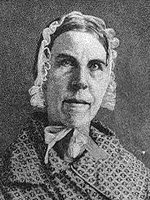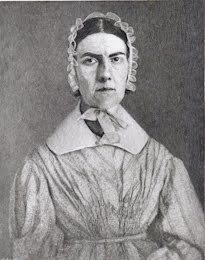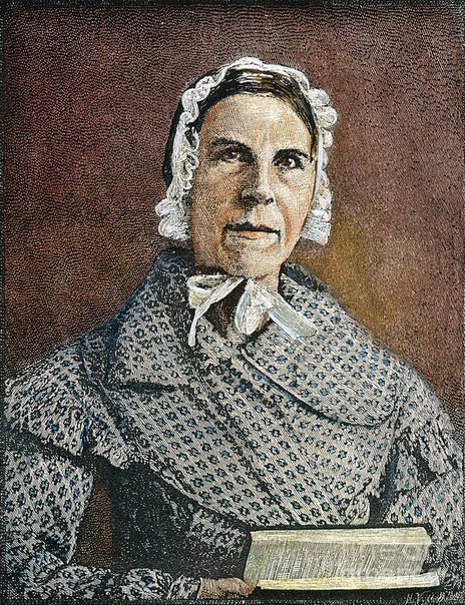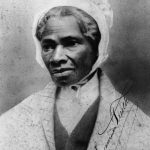Abolitionist and Women’s Rights Activist
The first woman to address a state legislature (Massachusetts in 1836), Angelina Grimke fearlessly traveled across New York and New England, speaking out against slavery at a time when women were scarcely seen and never heard in the public arena. In order to lecture about this sensitive issue she had to first fight for her right, as a woman, to participate in the abolionist movement.
Born and raised in South Carolina, Grimke grew to detest the institution of slavery at an early age. Unable to influence her family to free their slaves, Angelina joined her older sister Sarah in Philadelphia, where they became Quakers, and soon thereafter began to fight for emancipation.
Sisters Sarah and Angelina Grimke were born into a plantation-owning, slave-holding family in South Carolina. Unable to attend law school because of restrictions on women’s education, Sarah, who had just turned 13, was delighted when Angelina was born. The two remained close friends throughout their lives.
The sisters both questioned slavery, but it was not until Sarah Grimke traveled to Philadelphia that the sisters felt there was anything they could do as young women. In Pennsylvania, Sarah was introduced to the Society of Friends (Quakers), who had liberal views on slavery and gender equality. She moved permanently to Philadelphia in 1820.
Angelina first spoke out against slavery in the Presbyterian Church she and her family attended in Charleston, but became frustrated with the minister who spoke with her privately against slavery but refused to denounce it publicly. Instead of leaving South Carolina, Angelina stayed on, hoping to convince her family to abandon slavery.
Six months of discussion, intense prayer, family upheavals and visits from friends and clergy did not change Angelina’s mind, nor did her arguments produce any resulting change among her family or friends. After explaining her beliefs to Presbyterian leaders she was expelled from the church.
Anti-Slavery Work
In 1829 Angelina joined Sarah in Philadelphia, and they became active members of the Quakers. The sisters entered the national spotlight as abolitionists when Angelina wrote a letter condemning slavery to William Lloyd Garrison, publisher of the abolitionist newspaper The Liberator. Garrison published Angelina’s letter, in which she volunteered to help in the cause.
Within a year, Angelina issued her most famous pamphlet, titled “Appeal to the Christian Women of the South,” urging white Southern women to help end the scourge of slavery:
I appeal to you, my friends, as mothers; are you willing to enslave your children? You start back with horror and indignation at such a question. But why, if slavery is no wrong to those upon whom it is imposed? Why, if as has often been said, slaves are happier than their masters, free from the cares and perplexities of providing for themselves and their families?
Why not place your children in the way of being supported without your having the trouble to provide for them, or they for themselves? Do you not perceive that as soon as this golden rule of action is applied to yourselves that you involuntarily shrink from the test; as soon as your actions are weighed in this balance of the sanctuary that you are found wanting?
In 1836 members of the American Anti-Slavery Society decided to devote all their resources towards enlarging their group of agents to spread the abolitionist gospel. Trained in New York City, this new class of lecturers and organizers – called the Band of Seventy – included Sarah and Angelina Grimke (who attended against the advice and without the permission of the Philadelphia Quakers).
Angelina Grimke gave her first speech in December 1836 in New York City, and then the sisters began a speaking tour of the Northeast, delivering speeches in 67 cities in 23 weeks. The public reacted quickly. As shocked as they were to see a woman speak in public, they considered it downright scandalous for a woman was speaking to a mixed audience of women and men – promiscuous audiences they were called.
Word soon spread of Angelina’s gifts as an orator, and many were curious to hear a white Southerner speak of slavery from an abolitionist point of view. However, her involvement in the political sphere drew condemnation from religious leaders and traditionalists, and she soon found herself defending their right to speak in public, following the lead of women like Sojourner Truth in linking the rights of blacks and women.
Speech Before the Massachusetts Legislature
While planning the lecture tour, fellow abolitionist Henry Stanton (future husband of women’s rights activist Elizabeth Cady Stanton) had proposed, in jest, that Angelina address the Massachusetts legislative committee. She had laughed at the thought, but later decided that she must do it. Surprisingly, the chairman of the committee was open-minded and agreed.
In February 1838, Angelina Grimke spoke before the Massachusetts legislature in the Boston State House, becoming the first American woman to address a legislative body. After she had lectured for quite some time, the committee was ready to adjourn. She boldly asked for more time another day, which was quickly granted. In the end, she addressed the group three different times for a total of more than six hours.
Press coverage was mixed. One hostile newspaper called her performance a farce and another pitied her delusion that women had a right to influence public affairs. Only a reform paper praised her without qualification: “It was a noble day when for the first time in civilized America, a Woman stood up in a legislative hall, vindicating the rights of woman.”
In this letter to her friend Sarah Mapps Douglass, Angelina described this unusual meeting. Angelina used the old-fashioned Quaker terms thee and thou when addressing another person:
As soon as we entered we were received by clapping… After the bustle was over I rose to speak and was greeted by hisses from the doorway, tho’ profound silence reigned thro’ the crowd within. The noise in that direction increased and I was requested by the Chairman to suspend my remarks until order could be restored. Three times was I thus interrupted… until at last one of the Committee came to me and requested I would stand near the Speakers desk.
I crossed the Hall and stood on the platform in front of it, but was immediately requested to occupy the Secretaries desk on one side. I had just fixed my papers on two gentlemen’s hats when at last I was invited to stand in the Speaker’s desk. This was in the middle, more elevated and far more convenient in every respect.
Now my friend, how dost thou think I bore all this? I never was favored with greater self−possession. I was perfectly calm – took up the thread of my discourse and by speaking very loud, soon succeeded in hushing down the noise of the people, and was suffered to continue for more than 2 hours without the least interruption… My subjects were the Dangers of Slavery, the Safety of Emancipation, Gradualism [gradual emancipation] and Character of the Free people of Color, the cruel treatment they were subjected to thro’ the influence of prejudice…
What the effect of these meetings is to be I know not, nor do I feel I have anything to do with it… No doubt great numbers who have attended them come out of mere curiosity; some to make fun of such a strange anomaly as a Woman addressing a Committee of the Legislature; they came despising me and my cause from the bottom of their hearts. But I trust the Lord will overrule all things to his own glory, the manumission of the slave and the elevation of woman…
Angelina Grimke knew she had accomplished something significant. She wrote another friend: “We Abolitionist Women are turning the world upside down,” adding, “I am sorely tempted to believe I have had a triumph.”
Women’s Rights Activist
Constantly confronted by discrimination against women in the abolitionist movement, the Grimke sisters turned their attention to women’s equality as well. In order to speak in public, Angelina had to constantly argue against the conventional philosophy that men and women were naturally meant to occupy separate spheres of existence – that woman’s role was in the private sphere, while men controlled the public sphere.
As has often been the case in history, some of the most fervent opposition to women’s rights came from other women. Catherine Beecher was well-known as a pioneering advocate for women’s education, who established many schools for women including the Hartford Female Seminary. As such, she was a public person by virtue of the organizations she created, and the leadership roles she played in society, yet she did not believe that women should have political roles.
Although Beecher argued that child-raising and women’s work in the household required that women be educated, she did not support women’s suffrage or the idea of women petitioning Congress. In response, Angelina wrote several letters to Beecher that were later published as Letters to Catherine Beecher, in which she vigorously defended her right to speak out in favor of causes like abolition.
Marriage and Family
The most forceful temperance orator in the western states, Theodore Weld (1803-1895) dedicated himself to the anti-slavery cause in 1830. Known to speak eight to ten hours a day, Weld was forced to stop speaking in 1836 due to a breaking voice. He continued working for the American Anti-Slavery Society, serving as editor of various publications and acted as an aid to anti-slavery members of the United States Congress.
After a long correspondence, Angelina Grimke and Theodore Weld were married on May 14,1838, in a ceremony without a clergyman, in which she did not promise to obey him. The ceremony included friends and fellow activists both white and black. Angelina was expelled from the Society of Friends for marrying a non-Quaker; Sarah was expelled for attending the wedding.
The couple moved with Sarah to Belleville, New Jersey, where they opened a boarding school. The Welds had three children: Charles Stuart Weld (born 1839), Theodore Grimke Weld (born 1841) and Sarah Grimke Weld (born 1844). The family focused their lives on demonstrating that they could manage a household without slaves. Angelina’s health declined.
The Grimke sisters and Theodore Weld compiled American Slavery As It Is: Testimony of a Thousand Witnesses (1839), which was published by the American Anti-slavery Society. It portrayed the horrors of American Slavery through a collection of first-hand testimonials and personal narratives from both freedmen and whites. The work describes the slave diet, their hours of work and rest, clothing, housing, privations and afflictions.
American Slavery As It Is was one of the most influential pieces of anti-slavery literature of the period, second only to Uncle Tom’s Cabin by Harriet Beecher Stowe, who used the book as inspiration for her abolitionist novel. This is an excerpt from American Slavery As It Is:
Slaveholders, the world over, have sung the praises of their tender mercies towards their slaves. Even the wretches that plied the African slave trade, tried to rebut Clarkson’s proofs of their cruelties, by speeches, affidavits, and published pamphlets, setting forth the accommodations of the middle passage, and their kind attentions to the comfort of those whom they had stolen from their homes, and kept stowed away under hatches, during a voyage of four thousand miles.
Theodore Weld established schools for students of all races and sexes at Eagleswood, New Jersey in 1854 and then in the Raritan Bay Community, New York. He was back in action during the Civil War speaking for the Union cause and the Republican Party, while both sisters provided public support to Abraham Lincoln in letters and speeches.
Following the War, the Welds moved to Hyde Park, Massachusetts, where Theodore opened another school and continued to champion the rights of African Americans and women until his death. Sarah joined Angelina and her husband in Hyde Park, where they continued to campaign for women’s rights for the remainder of their lives.
Sarah died on December 23, 1873. After Sarah’s death, Angelina was paralyzed by several strokes shortly after Sarah’s death. Angelina died on October 26, 1879. Theodore Weld lived on until 1885.
Favorite Angelina Grimke Quote:
The denial of our duty to act in this case is a denial of our right to act; and if we have no right to act, then may we well be termed the white slaves of the North, for like our brethren in bonds, we must seal our lips in silence and despair.
SOURCES
God in America: Angelina and Sarah Grimke
Internet Encyclopedia of Philosophy: Sarah Grimke and Angelina Grimke Weld






